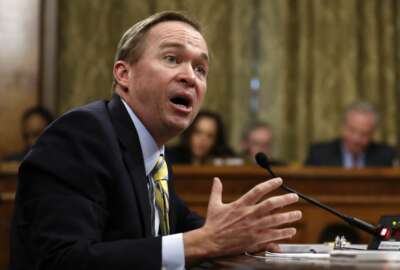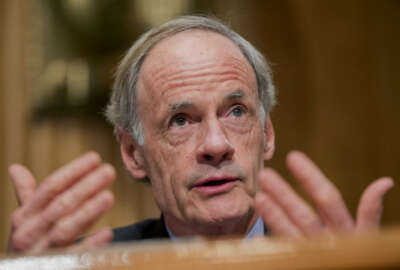
Rollout of project management law promises responsible use of taxpayer dollars
The Program Management Improvement and Accountability Act of 2015 would create a "culture of excellence," promoting wise use of taxpayer dollars.
The Project Management Improvement Accountability Act will be a “transformative tool” to help agencies cut down on wasteful spending — as long as its rollout doesn’t hit too many speedbumps under the new administration.
During a Feb. 15 Congressional Government Efficiency Caucus hosted alongside the Project Management Institute (PMI), lawmakers on both sides of the aisle said they were hopeful the newly enacted law [December 2016] will be more than just “a nice thing to do.”
“It’s not just something that interests us who live within the Beltway,” said Rep. Gerry Connolly (D-Va.) “It’s actually something that has power to it and that can really better serve our constituents, improve our productivity and morale, and actually free up resources in a way that doesn’t cut anything, that doesn’t hurt anything and that in fact improves things.”
Comptroller General Gene Dodaro, in his Feb. 15 testimony to the House Committee on Oversight and Government Reform, said the PMIAA was one of several congressional actions that “if implemented effectively, will help foster progress on high-risk issues governmentwide.”
The law requires the Office of Management and Budget deputy director to:
- Adopt and oversee implementation of governmentwide standards, policies, and guidelines for program and project management in executive agencies.
- Conduct portfolio reviews to address programs on the Government Accountability Office’s High-Risk List.
The law, according to a GAO report, also creates a Program Management Policy Council to serve as a forum for improving practices for program and project management, and make recommendations to the OMB deputy director.
PMI’s latest Pulse of the Profession 2017 report found that government organizations waste about $97 million for every $1 billion invested, compared to $122 million wasted for every $1 billion invested in 2016.
PMI President and CEO Mark Langley said the law was important for three reasons. The first is that program managers are the first line of defense for what an agency should be doing.
“Unfortunately that’s not formalizing across the federal government, so we see pockets of excellence, but we have seen an opportunity to bring those pockets of excellence and move them across the government,” Langley said.
Langley said the law also ensures more consistent outcomes, which lead to more reliable results, “so that when we decide to fund a major program we can have the assurance that it will be delivered efficiently and effectively.”
The PMIAA also contributes to a “culture of excellence” in program management, ensuring taxpayer dollars are spent wisely, Langley said.
“When you think about the premium there is for efficiency, by investing in and improving program management, not only in the private sector but the public sector, there’s quite a bit to be gained,” Langley said. “In the private sector it’s about efficiency and return on investment, and in the public sector it’s about the value for money.”
That value for money is at the top of the list of concerns for taxpayers, said Sen. Heidi Heitkamp (D-N.D.), who spoke at the caucus.
“Internally in this country, the thing that bothers people the most about the federal government is not that their priorities are wrong, they believe that the dollars that they spend, that they’ve worked so hard for, that they send to the people here in Washington to spend, should be watched and guarded the way they manage their own dollars,” Heitkamp said.
Sen. Joni Ernst (R-Iowa) said she told Mick Mulvaney, President Donald Trump’s pick for OMB director, about how important it was for the PMIAA to be properly implemented.
“We need to make sure our biggest government projects and programs are being run appropriately and are being managed by people with the right expertise in those areas, and those that have the right level of job experience,” Ernst said.
Ernst told Federal News Radio she thought Mulvaney would be “diligent” in his oversight of the law’s rollout.
But Robert Burton, a partner with Crowell & Moring’s government contracts group and a former deputy administrator of the Office of Federal Procurement Policy (OFPP), said “there’s no question this will probably take longer than we would like.”
Burton said it was critical that Congress keep pressure on OMB.
“They do respond to pressure from the Hill and also from the administration,” Burton said, adding that whatever the top priorities are for the OMB director and his aids, will be what’s important to career officials in the department.
“Leadership from the top is so important,” Burton said. “As long as we have that, I think OMB will move very aggressively to get this implemented.”
Copyright © 2025 Federal News Network. All rights reserved. This website is not intended for users located within the European Economic Area.





